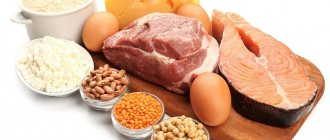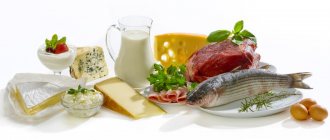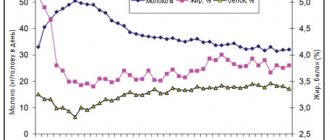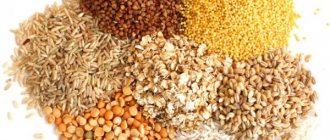No more than 30–50 g of protein is absorbed in one meal. Can't the body absorb more? This article will explain how protein is digested.
How many grams of protein are absorbed in one meal?
What is the maximum amount of protein the body can absorb in one meal? There is a hypothesis that a person absorbs 30–50 g of protein regardless of body weight (both men and girls).
In fact, our body is capable of more.
Initial phases of protein digestion
Before delving into the amount of protein and other tangible indicators, it is worth remembering, at least in the most general terms, how exactly protein is absorbed by the human body. Considering that the true extent of this process is worthy of an academic cycle, we will still try to take this course as an external student and find out how it happens.
Protein is a protein, it is a building material without which any cell, tissue and organ of our body cannot do. It is found in large quantities in seafood, meat, eggs, fish, cottage cheese, and dairy products.
You probably already know that the digestive process begins in the mouth, where food is physically broken down. After your incisors and molars have done their dirty work, the crushed food/nutrients (in our case, protein) are sent to the stomach, where the digestion process begins.
The epithelium of the stomach produces gastric juice, which consists of hydrochloric acid, sodium chloride and potassium chloride. These acids initiate the chemical breakdown (denaturation) of protein molecules and activate digestive enzymes necessary for further digestion.
One of the key proteolytic enzymes is pepsin. For people who eat a lot of protein foods, naturopaths recommend taking this enzyme in addition, but the value of such advice can be questioned.
Food sources of complete protein
For every person, proteins are an integral part of a balanced diet. Proteins contained in products are divided into two groups according to their value:
- A complete group that contains a complete set of essential amino acids. This applies to products of animal origin.
- Inferior group, which includes products of plant origin.
Protein-rich foods:
- eggs contain about 20 percent protein with the required amount of amino acids;
- cottage cheese contains 14% protein;
- hard cheeses - 30%;
- poultry meat - 17 percent protein;
- beef and liver - 25%;
- fish and seafood - 20-25% protein;
- legumes and soybeans - 14 percent;
- cereals - 12%;
- Brussels sprouts - 9%.
Late phases of protein digestion
During the process of denaturation, the protein breaks down into polypeptide molecules, which are sent to the duodenum, the proximal part of the small intestine. The duodenum is where most of the protein is digested and amino acids are absorbed. The army of proteolytic enzymes in the small intestine is called upon to break down polypeptides into free amino acids and minute amounts of di- and tripeptides.
This figure shows the primary molecular structure of a protein.
At the final stage of protein digestion, free amino acids are sent to the intestinal cells or go directly into the bloodstream and rush to the liver. Once in the liver, amino acids are included in various metabolic processes and are used based on the immediate needs of the body (for example, for protein synthesis, as raw materials for gluconeogenesis, etc.).
How much protein can the body digest in one sitting?
Having covered the basics of protein digestion, let's take a critical look at the theories and studies that have looked at how much protein can be digested in a given time. It should be noted that we are talking about how much protein can be absorbed, not how much can be used in muscle protein synthesis (MPS). Digestion and SMP are not interchangeable terms, although many people think so.
The hypothesis that the human body has a fairly conventional “protein ceiling” at the level of 30-50 grams has no evolutionary or biochemical justification. In reality, the assumption that your body cannot digest/absorb more than 30-50 grams of protein at a time inherently means that anything above that limit is excreted.
In fact, instead of digesting the “excess” protein, the body magically transits it through the thorny and tortuous digestive tract, bypassing the previously discussed digestive process and sending it to the large intestine. Hmmmm…. if this point of view on physiological processes were correct, we would simply be twisted, not to mention the fact that we would have to live in a toilet.
Moreover, you are unlikely to find literature that states that the body cannot absorb more than 30-50 grams of protein at a time. On the contrary, scientific literature states that the body can indeed digest large volumes; it just takes longer. In fact, rather than passing excess protein into the large intestine, the body regulates the rate of digestion by slowing the evacuation of bolus food from the stomach to the proximal small intestine (in other words, increasing the amount of time it takes for food to be digested in the stomach). Extreme people who like to make the most absurd assumptions, for example, consuming 200 grams of protein at a time, will ask whether the body can digest this horse dose? To be honest, yes, but not all the protein will go to, let’s say, “good purposes.”
Protein can be converted into fats, but the biochemical mechanisms for such conversion are inefficient, so the significance of such conversion is small. It is more likely that the lion's share of the protein will not go to the MPS or another anabolic process, but will be used by the liver for gluconeogenesis and will be stored in the form of glycogen.
So, you can eat large portions of protein foods whenever you want, but don't go to extremes if you want to make the most of all the amino acids.
Product compatibility. Proteins fats carbohydrates
When taken together, different products have different effects on each other's absorption. Proteins, fats and carbohydrates must be taken in small quantities. The basis of the diet should be vegetables and fruits. Also foods containing protein. These are eggs, cottage cheese, meat and fish. It is healthy to eat potatoes, pasta and bread, which are rich in carbohydrates. According to many scientists, proteins and carbohydrates are not considered compatible products and can cause damage to human health.
Once in the stomach, proteins increase acidity, which stops the digestion of carbohydrate foods, which can only be absorbed in an alkaline environment. Never combine fats and proteins. For example, meat, eggs and vegetable or butter. Otherwise, fat will interfere with the production of gastric juice. Try not to combine sour fruits with proteins. Fruit acids will delay the natural production of gastric juice and interfere with the normal digestion of protein foods. Also, this combination of products can lead to fermentation. Remember, the simpler the food, the healthier it is. Healthy eating is the key to a long and fulfilling life. Try to eat melon separately from all other foods. Also eat potatoes and porridge with bread separately, otherwise fermentation and bloating will occur in the intestines, which is fraught with serious complications.
Protein intake per day
Protein plays a very important role in our body. It performs construction, energy, transport, and protective functions. It also serves for the growth of muscle mass and normal human functioning.
The indicator of how much protein is absorbed at a time is different for each person. It depends on numerous factors:
- body weight;
- growth;
- intestinal and liver size;
- level of physical activity;
- metabolism and other features.
Your daily protein requirement can be roughly calculated based on your weight. So, for an ordinary person, one gram of protein is enough per 1 kilogram of body weight. For athletes working on building muscle, this figure is slightly higher and ranges from 2 to 3 grams of protein per kilogram of weight.
Protein enters our body with food intake and is completely absorbed by the intestines. Therefore, to the question “how much protein is absorbed at one time?” It’s impossible to answer unequivocally. This depends entirely on how much protein is contained in a serving. You can eat 50 or even 100 grams of protein, and in both cases it will be absorbed very well.
The amount of protein received per day may be significantly higher than the daily requirement. However, in such cases there is no need to talk about excess protein. The thing is that the small intestine can absorb up to 700 grams of protein in 24 hours. If you eat 701 grams of protein per day, then you can safely assume that 1 gram was extra. But it is simply unrealistic for an ordinary person to do this. Only professional bodybuilders with a body weight of about 120 kilograms can cope with this task. To build muscle, they need to consume up to 5 thousand calories or a little more than 1 kilogram of protein per day.
If this dose is divided into eight meals, we get about 140 grams of protein per serving of food. And this is almost 5 times more than the so-called one-time protein norm of 30 grams. This fact once again proves that there is no fixed amount of protein that is absorbed in one meal. Otherwise, we would still not know who bodybuilders are.
How does protein absorption occur?
Most people who rely on the magic of numbers often have no idea what actually lies behind it. As mentioned above, each human body is individual. Therefore, it is foolish to think that more than thirty grams of protein is not absorbed. Since we all have different muscle mass, liver size, intestines, physical activity, all this plays an important role in the process of protein absorption. It is, based on these facts, that your main guide is yourself. In our body, everything is not so simple as to limit metabolic processes and place them in some kind of box, in the form of a specific number.
Digestion (breakdown) and absorption of protein is a very complex and multi-stage process in which enzymes, hormones and the intestine itself interact, from where protein is absorbed.
When food enters the body, almost all of it is digested and absorbed. And this is why people gain extra pounds, because the body cannot throw away extra nutrients. If you are concerned about building muscle, then protein is what you need, since it is the building material for muscle mass, but do not forget about nutrition - it is advisable to eat food five times a day and in equal portions. But, even if you are not interested in gaining muscle and strength, you still need to consume protein for the normal functioning of the body. Most people do not realize that the process of digesting food is a whole complex system. And the quality of absorption itself will depend on many reasons, for example, the expiration date of the food product, what kind of processing it was subjected to, as well as your health at the time of consumption. Protein, as such, is a complex substance and just like glucose, it is not immediately absorbed and will not enter the bloodstream; first, it needs to be properly digested, and this varies over time. In order to understand the duration, it is enough to remember that if you eat 100 grams of 100% protein (sports nutrition), it will be digested in about 30 minutes, but this despite the fact that the sports nutrition (protein) has already been broken down into amino acids. However, what can we say about natural products such as porridge, cottage cheese, eggs, meat, fish, beans, of course, they require many times more time for complete absorption.
In order to digest and assimilate natural protein products, our body expends resources not only from the stomach, but also from the intestines, enzymes and hormones. That is why the duration is reduced to 2-4 hours. Now it becomes clear that the statement “more than thirty grams of protein is not absorbed at one time” is another myth that people like to fool. Now you understand the absurdity of the question: “How much protein is absorbed at a time?”
Protein content in food
To get a general picture of the protein content in a particular product, you just need to know the following:
- 150 grams of cheese - 37 grams of protein
- 200 grams of low-fat cottage cheese - 37 grams of protein
- 150 grams of beans - 31 grams of protein
- 100 grams of caviar – 31 grams of protein
- 1 liter of milk contains about 31 grams of protein and so on.
Of course, these data are given so that you are aware of where and how much protein can be found, not at all so that you frantically run around with weights and go crazy, although some who engage in bodybuilding behave exactly like this. But for an ordinary person interested in their health, it is important to remember that 0.5-1 grams of protein per day per kilogram of body weight will be sufficient to maintain health. As for those who want to build muscle mass or to maintain it, they need to consume 2-3 grams of protein per kilogram of body weight.
Bodybuilders prefer the leanest protein sources that contain so-called “good” fats, these include: various varieties of lentils, beans, beans, chickpeas...
How much protein is absorbed at a time?
Is there a limit to protein absorption per meal? For training people, the value of this issue is very high. Considering the variety of nutritional patterns (some eat 2 times a day, some in the fitness community, it is important to understand how much protein is absorbed in one meal.
For training people, the value of this issue is very high. Considering the variety of nutritional patterns (some eat 2 times a day, some in the fitness community, it is important to understand how much protein is absorbed in one meal.
Review on the topic: How much protein can you eat at a time?
Surely you have heard the opinion that you should not consume more than 30 g of protein at a time. This review will reveal what this statement is based on and how much protein you can actually eat at a time, with links to scientific data. Go!
“The body absorbs no more than 30 g of protein in one meal” - true or false?
More recent studies (AM J CLIN NUTR. 2009 and JOURNAL OF THE AMERICAN DIETETIC ASSOCIATION. 2009) have examined the effects of protein intake on post-exercise recovery. The essence of the experiment was that after training, the experimental group took whey protein and went to rest, and after 4 hours they were tested. From this group, some did not take protein at all, some took 20 g, others 30, 50, etc.
The experiment showed that taking more than 30 g of protein at a time does not provide any increase in protein synthesis, i.e. large portions do not affect recovery. It is worth noting that these studies examined the effects of protein intake immediately AFTER EXERCISE on RECOVERY.
The second study involved both young and older people. After the load, the “test subjects” were fed meat in quantitative terms of pure protein 30 g and 90 g. You can use KSB 55 for control and to know how much you can consume. Study conclusion: 90g of protein did not make any difference in recovery (muscle synthesis) compared to 30g.
It is not correct to close the question of the maximum one-time protein intake based on studies that studied exclusively muscle synthesis after training, and even after 2-4 hours (note that the issue of protein absorption by the body was not studied)!
But someone took these studies as a basis and released two common myths onto the Internet:
- “taking more than 30 g of protein at a time is not absorbed by the body, creates a load on the kidneys, and wastes your money in the toilet,”
- “excess protein over 30 g will directly go into fat.”
Well, that's nonsense!
If our body absorbed only 30 g of protein per meal, then people such as military personnel, lumberjacks, builders, miners, miners in general are people who work very hard and eat 2-3 times a day, because... There’s simply no time, they’d just die from their work. And if they didn’t die, they would very quickly become “uncomfortable” from a lack of nutrients.
Failure to digest more than 30 g of protein at a time is a fiction
Our world is large and there are people in it who are far from the topic of sports and proper nutrition. They all eat on average 2-3 times a day. If the body absorbed only 30 g of protein at a time, humanity would die from protein deficiency.
In addition to what has been said, it is worth considering that people of average build weighing approximately 70 kg were studied. Obviously, for a 100 kg athlete, 30 grams of protein will have less effect on muscle synthesis than for a 70 kg athlete.
Anatomy, physiology and common sense must prevail!
How much protein can our body actually absorb?
Study conducted by J NUTR. in July 2000, “Protein feeding pattern does not affect retention” was carried out on girls. One group of girls ate the daily protein intake in one meal, and the second in 4. In total, both groups took the same amount of protein. Study conclusion: There is no difference in muscle synthesis and nitrogen balance between the two groups.
Another study on intermittent fasting conducted in November 2009 by AM J CLIN NUTR. entitled “Intermittent fasting does not affect whole-body glucose, lipid or protein metabolism” showed that a single intake of 101 g of protein (for the whole day) has no effect on the preservation and change of muscle composition, compared with control groups that ate those 101 g of protein in 2 or 4 doses.
Everyone knows that the absorption of protein, especially from meat, is a costly and labor-intensive process (especially in terms of time). Digestion of food and its absorption takes a very long time, especially products such as cottage cheese and casein (almost up to 6 hours).
The small intestine is the main site of nutrient absorption
Digestion of food depends primarily on the proper functioning of enzyme systems, on the normal functioning of the digestive glands and gastric juice. With healthy systems, there should be no problems with absorption.
The degree of absorption of nutrients (including protein) by our body depends on the absorption capacity of the small intestine. Nature has endowed the intestines with a simply enormous ability to absorb various substances. In a day, a person can “suck in” half a kilo of fat, 500-700 g of protein, 20 liters of water, etc.
This way, a large single dose of protein will be digested and absorbed completely, but it will take longer than digesting a smaller portion.
Conclusion and conclusions
There is no need to worry about how much protein our body can absorb in one meal. The only exception is if you are going to eat 700 g of protein at a time. However, think about whether it is advisable to “eat” so much, sorry, eat)))
The more protein you take at one time, the longer the process of digestion and absorption will be. That's all!
Get better and stronger with bodytrain.ru
Read other articles in the blog's knowledge base.
Related posts:
Step-by-step instructions for losing weight - an overview of the most effective techniques
Is it possible to use soy sauce when losing weight?
What to drink tea with when losing weight
Is it possible to lose weight on a pearl barley diet? Source: bodytrain.ru
This is interesting: Training during pregnancy: safe and effective methods of training during pregnancy, tips and recommendations for pregnant girls
Useful tips
For a better understanding of the issue of protein content in a particular product, there is a calorie table in which you can see the amount of protein opposite each product. So, here are the basic tips for digesting protein:
- everyone's metabolic processes are different
- every person is individual
- there are no axioms about the fact that for each meal only
- a certain amount of protein
- After reading the article, you should not make your diet a complete protein diet. Going from one extreme to another has never served anyone well.
- experiment with nutrition and do not forget about balance, about the fact that the body needs to consume all useful substances: proteins, carbohydrates, fats, minerals, vitamins and microelements
- stick to a certain amount of food at each meal, and do not fill your stomach with food until it hurts (even the most healthy), try to find a path to harmony and develop awareness that food, first of all, serves as a good helper for your health, and not to satisfy the taste buds on the tongue
Proper, balanced nutrition allows the body to consume all useful substances: proteins, carbohydrates, fats, minerals, vitamins and microelements. - If you work out in the gym or simply give your body physical activity, then the amount of daily dose of protein needs to be increased, since it is a building material for muscles. And for those who have large muscle mass, you need to eat 2-3 grams of protein per kilogram of body weight.
Now answer yourself, is it possible to find out how much protein is absorbed at a time? Of course not, since it all depends on many factors.
Proteins, fats and carbohydrates are sources of proper metabolism
A rational and healthy diet contains a set of useful substances such as proteins, fats and carbohydrates. The required ratio depends on the person’s way of life. Protein and carbohydrates are equally necessary for humans. They are considered sources of energy and beauty. A deficiency of carbohydrates will lead to disruption of the metabolic process. They enter the human body together with glucose and, like proteins, are involved in many functions. Protein and carbohydrates are necessary for the normal, full functioning of the body. The latter provide the body with vitamins and minerals. Carbohydrates are found in vegetables and fruits, as well as in bread, pasta, and potatoes.
Contraindications to the use of protein
There are cases when, for health reasons, a person is contraindicated in consuming protein, that is, it can be consumed, but in very small doses. For example, when you have kidney disease, such as renal failure, gout, as well as gastrointestinal tract disease (chronic and acute pancreatitis, cholecystitis, colitis), protein is an extremely undesirable product. The occurrence of allergic reactions to soy protein is also a contraindication to its consumption. In such situations, it is better to consult a doctor in order to avoid negative consequences and not harm your body.
The myth that 30 grams of protein is absorbed at one time
You can often hear the myth that only 30 grams of protein can be absorbed at a time. Such figures, of course, are true, but for the average person who leads a quiet lifestyle and therefore does not need an increased amount of protein. Athletes absorb 30 grams of protein and 40 grams or more at a time.
The body is a whole system that can be trained. That is, you can train both the muscles and the digestive system. More precisely, everything happens at the same time; training the whole body is a single process. They should not be considered as separate components. And if the body feels the need for an increased amount of protein, then it will absorb as much as it needs.
Professional bodybuilders weigh close to 120 kg during competitions at their peak. And at this time, their body requires about 4000-5000 calories per day. And during the cutting phase, these guys eliminate carbohydrates, but in order not to lose muscle they need to consume a large amount of calories, which they get from protein. Of course, during drying, the amount of calories consumed decreases significantly, but for a person weighing 100 - 120 kg it will still be significant. That is, it turns out that professional athletes need to eat practically only protein in order to get dry, but not lose muscle. If you need to consume enough calories in one meal, but eat carbohydrates. It turns out that 1 kg of protein is about 4000 calories. If you divide this into 8 meals, you get 125 grams of protein per meal. Which is 4 times more than the so-called norm for protein absorption at a time, and this is not yet the daily norm of necessary calories for growth. And if the maximum amount of protein that can be absorbed at one time was 30 grams, then how could bodybuilders become so huge.
I hope now you will no longer have any questions about the rate of protein absorption in one meal. You can safely throw in extra grams of protein without fear that they will not be absorbed. The main thing is that there is a need for an increased amount of protein. This article about nutrition tells you how to plan your diet. But I advise that it is better to distribute the daily protein intake evenly over several doses throughout the day. Since it will not be possible to compensate for the morning protein deficiency by taking it additionally in the evening or vice versa. Therefore, you can buy yourself this protein shake and take it when you can’t eat. For well-wishers who are still confident that only 30 grams of protein can be absorbed at a time, I advise you to carefully watch the video. It contains both simple common sense arguments and scientific arguments.
Illustrative study
Scientists at the Beltsville Research Center conducted an interesting experiment using the tactics of intermittent fasting (Intermittentfasting):
During the 8-week experiment, the subjects were divided into 2 groups. The first group abstained from eating completely for 18 hours a day and consumed 86 grams of protein only within a 4-hour window. The second group distributed the same amount of protein over 3 meals evenly throughout the day. As a result, the first group experienced significant improvements in body composition (including an increase in lean muscle mass), while the second group did not experience statistically significant improvements.
Data from long-term studies indicate that our body is able to digest and use much more protein for muscle building than the 30 grams received in one meal . There is a scientific explanation for this, which is hidden in the peculiarities of the physiology of digestion.
How much protein is in different foods?
To get 31 g of protein you need to eat 100 g of caviar or 150 g of beans or drink 1 liter of milk. To obtain 37 g of protein, you will need 200 g of cottage cheese (low-fat) or 150 g of cheese. For an ordinary person who is concerned about his health, he should consume 0.5 - 1 g of protein per kg of weight per day. And for those who want to build muscle mass, the figure should be increased to 2-3 g/kg body weight. Some people have difficulty digesting milk products due to the absence or insufficient amount of the lactase enzyme. But it breaks down milk carbohydrates, not proteins. Therefore, the roots of this problem clearly do not grow from here.
How much protein do you need per day?
Let's start by dispelling some of the existing myths associated with protein consumption. First. I would like to note that our body absorbs no more than 30 grams of protein per meal. Our body begins to digest protein in the stomach and continues to absorb it until it is completely broken down in the small intestine. Cleavage occurs with the help of special enzymes such as pepsin, trypsin and carboxypeptidases. These enzymes begin to be released from the moment food enters the stomach until the food is completely digested. Therefore, it is incorrect to assume that more than 30 grams per meal.
Pay attention to professional bodybuilders: they consume 350–400 grams of protein per day and do not experience stomach problems. If the body absorbed 30 grams per meal, then they would have to eat every 20 to 30 minutes. To provide muscle growth. Any amount of protein will be absorbed, it just all depends on the quality and quantity of protein received.
If, for example, you take 30 grams of protein isolate and drink it with water, it will be completely absorbed in 1-1.5 hours, since it is in an accessible form for absorption by our body. A 250 gram pack of cottage cheese can be absorbed by our digestive tract for up to 7 hours, although this is the same 30 grams of protein as isolate. But our body requires the production of additional enzymes. To provide our body with building material for muscle growth, most sports doctors and athletes recommend eating up to 2.5-3 grams of protein per body weight. It turns out that if you weigh 75 kg, then you need to eat up to 225 grams of protein per day, but protein is not the only one involved in building muscles, so you should add a large amount of slow carbohydrates to your diet. Such as porridge, cereals, pasta and vegetables. The main thing is to try to eat more calories than you burn, then you will be able to gain the necessary muscle mass.
The harmful effects of proteins or proteins have not been confirmed by any study conducted by modern institutes and research centers.
All speculation that protein spoils the liver is not correct, since protein is part of our diet. A large amount of protein entering our body does not lead to liver or kidney failure. To achieve this effect, you need to eat only boiled meat without a side dish every day for a month in large quantities, this will lead to clogging of the liver and kidneys with toxins, and with our budgets this is not possible. So you are not in danger of dying from proteins.
faktor-sporta.ru/mif-o-tom-chto-za-odin-raz-usvaivaetsya-30-gramm-belka.html dailyfit.ru/pitanie-i-dieta/kakoe-kolichestvo-proteina-vam-po-zubam / krasota1zdorove.ru/skol-ko-belka-usvaivaetsya-za-raz/ legkopolezno.ru/zozh/pitanie/skolko-belka-usvaivaetsya-za-odin-priem-pischi/
Algorithm for combining products with each other
- It is not recommended to combine the intake of foods containing sugar and starch with proteins and sour fruits;
- the time between meals should be at least 4 hours;
- You should also not combine proteins with sugar, flour and margarine.
All food products have a conditional division between themselves:
- products containing starch composition;
- protein;
- neutral.
Based on their digestibility in the stomach, food products are classified according to two main points:
- Protein foods of animal and plant origin. This includes all types of meat and meat products, grains and legumes, eggs, and dairy products.
- Starchy foods. This is bread, all products made from flour, cereals.











